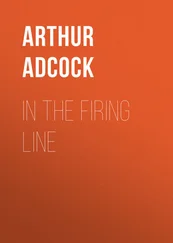Robert Chambers - The Firing Line
Здесь есть возможность читать онлайн «Robert Chambers - The Firing Line» — ознакомительный отрывок электронной книги совершенно бесплатно, а после прочтения отрывка купить полную версию. В некоторых случаях можно слушать аудио, скачать через торрент в формате fb2 и присутствует краткое содержание. Жанр: foreign_prose, foreign_antique, на английском языке. Описание произведения, (предисловие) а так же отзывы посетителей доступны на портале библиотеки ЛибКат.
- Название:The Firing Line
- Автор:
- Жанр:
- Год:неизвестен
- ISBN:нет данных
- Рейтинг книги:5 / 5. Голосов: 1
-
Избранное:Добавить в избранное
- Отзывы:
-
Ваша оценка:
- 100
- 1
- 2
- 3
- 4
- 5
The Firing Line: краткое содержание, описание и аннотация
Предлагаем к чтению аннотацию, описание, краткое содержание или предисловие (зависит от того, что написал сам автор книги «The Firing Line»). Если вы не нашли необходимую информацию о книге — напишите в комментариях, мы постараемся отыскать её.
The Firing Line — читать онлайн ознакомительный отрывок
Ниже представлен текст книги, разбитый по страницам. Система сохранения места последней прочитанной страницы, позволяет с удобством читать онлайн бесплатно книгу «The Firing Line», без необходимости каждый раз заново искать на чём Вы остановились. Поставьте закладку, и сможете в любой момент перейти на страницу, на которой закончили чтение.
Интервал:
Закладка:
As for the other people at the table Hamil began to distinguish one from another by degrees; the fair-haired Anans, sister and brother, who spoke of their celebrated uncle, Winslow Anan, and his predictions concerning Hamil as his legitimate successor; Marjorie Staines, willowy, active, fresh as a stem of white jasmine, and inconsequent as a very restless bird; Philip Gatewood, grave, thin, prematurely saddened by the responsibility of a vast inheritance, consumed by a desire for an artistic career, looking at the world with his owlish eyes through the prismatic colors of a set palette.
There were others there whom as yet he had been unable to differentiate; smiling, well-mannered, affable people who chattered with more or less intimacy among themselves as though accustomed to meeting one another year after year in this winter rendezvous. And everywhere he felt the easy, informal friendliness and goodwill of these young people.
"Are you being amused?" asked Shiela beside him. "My father's orders, you know," she added demurely.
They stood up as Mrs. Carrick rose and left the table followed by the others; and he looked at Shiela expecting her to imitate her sister's example. As she did not, he waited beside her, his cigarette unlighted.
Presently she bent over the table, extended her arm, and lifted a small burning lamp of silver toward him; and, thanking her, he lighted his cigarette.
"Siesta?" she asked.
"No; I feel fairly normal."
"That's abnormal in Florida. But if you really don't feel sleepy—if you really don't—we'll get the Gracilis —our fastest motor-boat—and run down to the Beach Club and get father. Shall we—just you and I?"
"And the engineer?"
"I'll run the Gracilis if you will steer," she said quietly.
"I'll do whichever you wish, Calypso, steer or run things."
She looked up with that quick smile which seemed to transfigure her into something a little more than mortal.
"Why in the world have I ever been afraid of you?" she said. "Will you come? I think our galley is in commission.... Once I told you that Calypso was a land-nymph. But—time changes us all, you know—and as nobody reads the classics any longer nobody will perceive the anachronism."
"Except ourselves."
"Except ourselves, Ulysses; and we'll forgive each other." She took a step out from the shadow of the oaks' foliage into the white sunlight and turned, looking back at him.
And he followed, as did his heroic namesake in the golden noon of the age of fable.
As they came in sight of the sea he halted.
"That's curious!" he exclaimed; "there is the Ariani again!"
"The yacht you came on?"
"Yes. I wonder if there's been an accident. She cleared for Miami last night."
They stood looking at the white steamer for a moment.
"I hope everything's all right with the Ariani " he murmured; then turned to the girl beside him.
"By the way I have a message for you from a man on board; I forgot to deliver it."
"A message for me ?"
"From a very ornamental young man who desired to be particularly remembered to Shiela Cardross until he could pay his respects in person. Can you guess?"
For a moment she looked at him with a tremor of curiosity and amusement edging her lips.
"Louis Malcourt," he said, smiling; and turned again to the sea.
A sudden, still, inward fright seized her; the curious soundless crash of her own senses followed—as though all within had given way.
She had known many, many such moments; one was upon her now, the clutching terror of it seeming to stiffen the very soul within her.
"I hope all's well with the Ariani " he repeated under his breath, staring at the sea.
Miss Cardross said nothing.
CHAPTER VII
A CHANGE OF BASE
February, the gayest winter month on the East Coast, found the winter resorts already overcrowded. Relays and consignments of fashion arrived and departed on every train; the permanent winter colony, composed of those who owned or rented villas and those who remained for the three months at either of the great hotels, had started the season vigorously. Dances, dinners, lawn fêtes, entertainments for local churches and charities left little time for anything except the routine of the bathing-hour, the noon gathering at "The Breakers," and tea during the concert.
Every day beach, pier, and swimming-pool were thronged; every day the white motor-cars rushed southward to Miami, and the swift power-boats sped northward to the Inlet; and the house-boat rendezvous rang with the gay laughter of pretty women, and the restaurant of the Beach Club flashed with their jewels.
Dozens of villas had begun their series of house-parties; attractive girls held court everywhere—under coco-palm and hibiscus, along the beach, on the snowy decks of yachts; agreeable girls fished from the pier, pervaded bazaars for charity, sauntered, bare of elbow and throat, across the sandy links; adorable girls appeared everywhere, on veranda, in canoes, in wheel-chairs, in the surf and out of it—everywhere youth and beauty decorated the sun-drenched landscape. And Hamil thought that he had never before beheld so many ornamental women together in any one place except in his native city; certainly, nowhere had he ever encountered such a heterogeneous mixture of all the shades, nuances, tints, hues, and grades which enter into the warp and weft of the American social fabric; and he noticed some colours that do not enter into that fabric at all.
East, West, North, and South sent types of those worthy citizens who upheld local social structures; the brilliant migrants were there also—samples of the gay, wealthy, over-accented floating population of great cities—the rich and homeless and restless—those who lived and had their social being in the gorgeous and expensive hotels; who had neither firesides nor taxes nor fixed social obligations to worry them, nor any of the trying civic or routine duties devolving upon permanent inhabitants—the jewelled throngers of the horse-shows and motor-shows, and theatres, and night restaurants—the people, in fact, who make ocean-liners, high prices, and the metropolis possible, and the name of their country blinked at abroad. For it is not your native New Yorker who supports the continual fête from the Bronx to the sea and carries it over-seas for a Parisian summer.
Then, too, the truly good were there—the sturdy, respectable, and sometimes dowdy good; also the intellectuals—for ten expensive days at a time—for it is a deplorable fact that the unworthy frivolous monopolise all the money in the world! And there, too, were excursionists from East and West and North and South, tired, leaden-eyed, uncomfortable, eating luncheons on private lawns, trooping to see some trained alligators in a muddy pool, resting by roadsides and dunes in the apathy of repletion, the sucked orange suspended to follow with narrowing eyes the progress of some imported hat or gown.
And the bad were there; not the very, very bad perhaps; but the doubtful; over-jewelled, over-tinted of lip and brow and cheek, with shoes too shapely and waists too small and hair too bright and wavy, and—but dusty alpaca and false front cannot do absolute justice to a pearl collar and a gown of lace; and tired, toil-dimmed eyes may make mistakes, especially as it is already a tradition that America goes to Palm Beach to cut up shindies, or watch others do it.
So they were all there, the irreproachable, the amusing, the inevitable, the intellectual, the good, and the bad, the onduléd, and the scant of hair.
And, belonging to one or more of these divisions, Portlaw, Wayward, and Malcourt were there—had been there, now, for several weeks, the latter as a guest at the Cardross villa. For the demon of caprice had seized on Wayward, and half-way to Miami he had turned back for no reason under the sun apparently—though Constance Palliser had been very glad to see him after so many years.
Читать дальшеИнтервал:
Закладка:
Похожие книги на «The Firing Line»
Представляем Вашему вниманию похожие книги на «The Firing Line» списком для выбора. Мы отобрали схожую по названию и смыслу литературу в надежде предоставить читателям больше вариантов отыскать новые, интересные, ещё непрочитанные произведения.
Обсуждение, отзывы о книге «The Firing Line» и просто собственные мнения читателей. Оставьте ваши комментарии, напишите, что Вы думаете о произведении, его смысле или главных героях. Укажите что конкретно понравилось, а что нет, и почему Вы так считаете.












